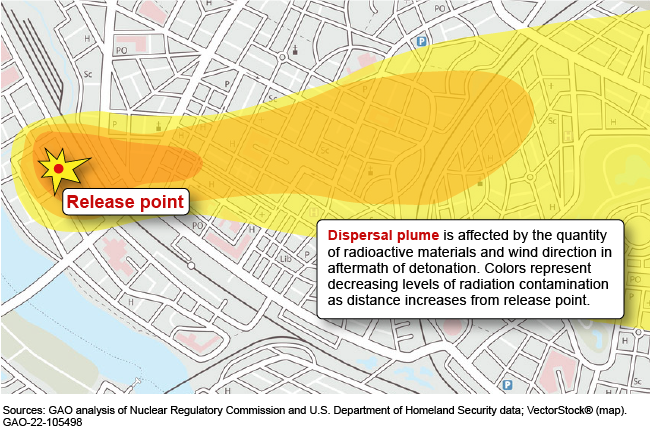Security of Radioactive Materials
Fast Facts
The risks of an attack using a dirty bomb—a weapon that combines a conventional explosive, like dynamite, with radioactive material—are increasing and the costs could be devastating.
This snapshot describes these risks and highlights recommendations from our prior reports for improving security for radioactive materials.
For example, weaknesses in Nuclear Regulatory Commission licensing for radioactive materials make it too easy for bad actors to obtain them, and NRC's security requirements don't account for the potentially devastating effects of a dirty bomb, such as billions of dollars in cleanup costs and deaths from chaotic evacuations.
Potential Dispersal of Radioactive Materials from a Dirty Bomb

Highlights
What GAO Found
The risks of a dirty bomb attack are increasing and the consequences could be devastating. GAO reported in 2019 that a dirty bomb using radioactive materials could trigger mass evacuations and have socioeconomic costs of billions of dollars. For example, an accident at a hospital in 2019 involving a small quantity of radioactive materials resulted in clean-up and other costs of $150 million for that building alone. Many GAO recommendations to reduce the risks of these materials have not yet been implemented.
Why GAO Did This Study
Numerous incidents indicate weaknesses in controls over radioactive materials that could be used in a dirty bomb. Vulnerabilities arise because NRC's security requirements do not take into account the most devastating potential effects, including billions of dollars in cleanup costs, and deaths and injuries from chaotic evacuations. In addition, weaknesses in licensing make it relatively easy for bad actors to obtain small quantities of high-risk radioactive materials, which could be dangerous in the wrong hands. Given the risks associated with these materials, which are in widespread use, it may be time to consider greater reliance on alternatives, when feasible. Previously, GAO has recommended that Congress consider this matter.
For more information, contact Allison Bawden at (202) 512-3841 or bawdena@gao.gov.
